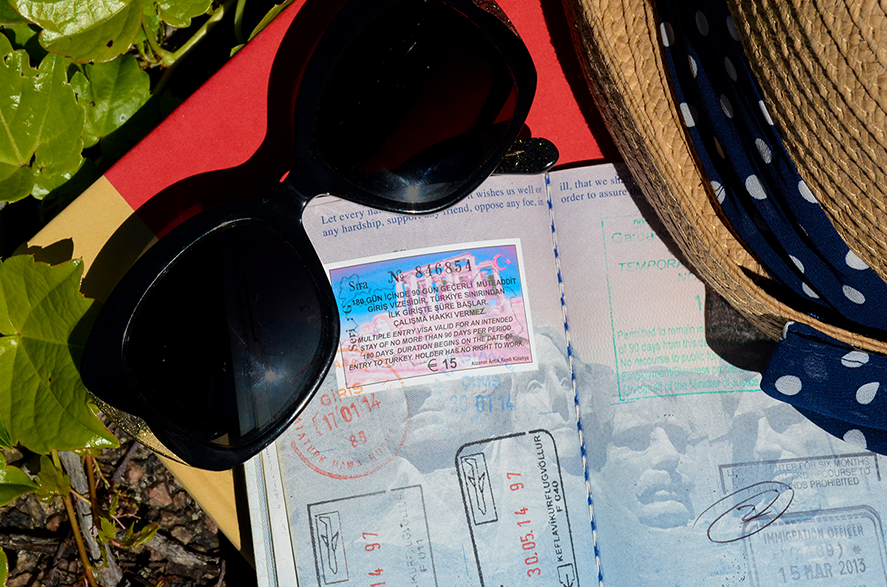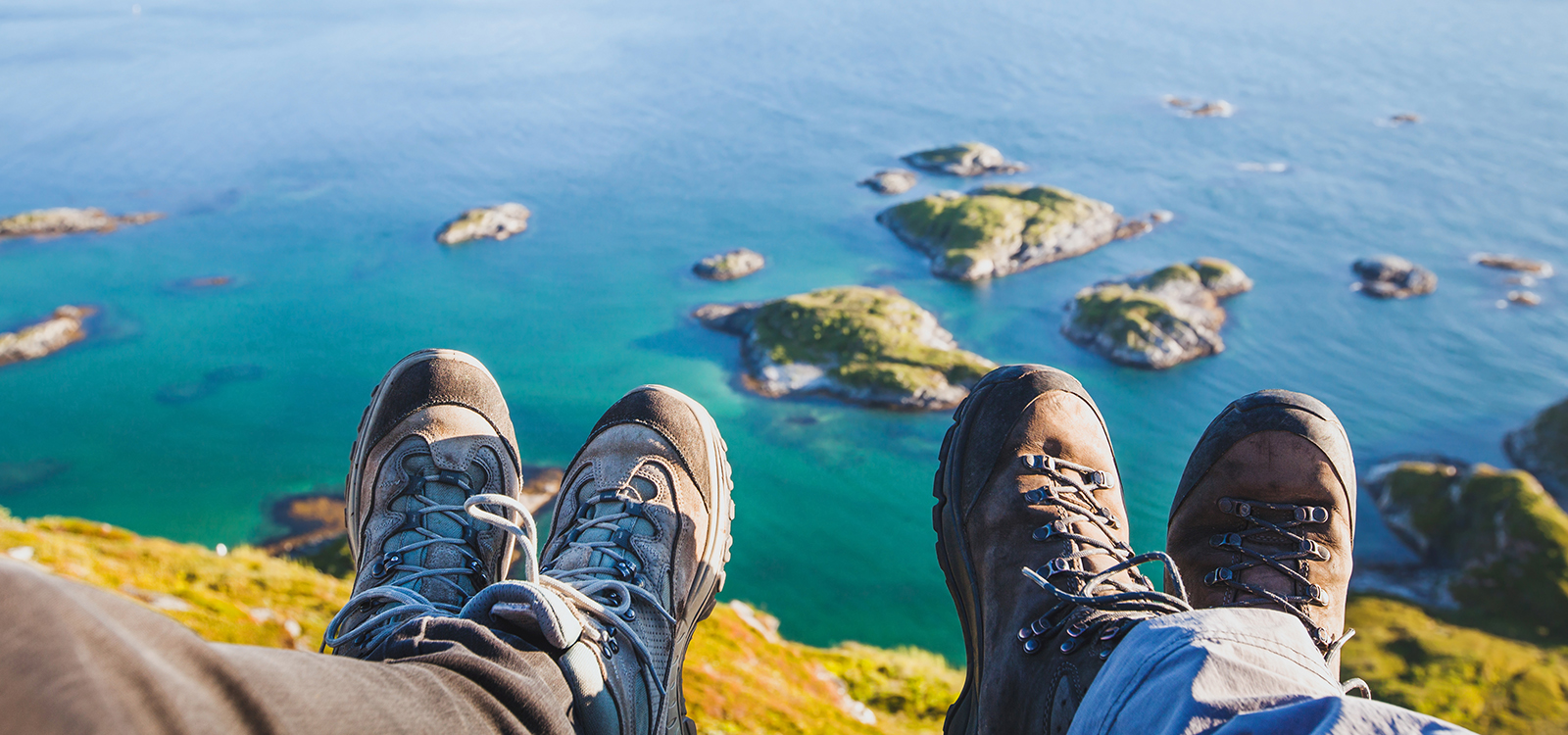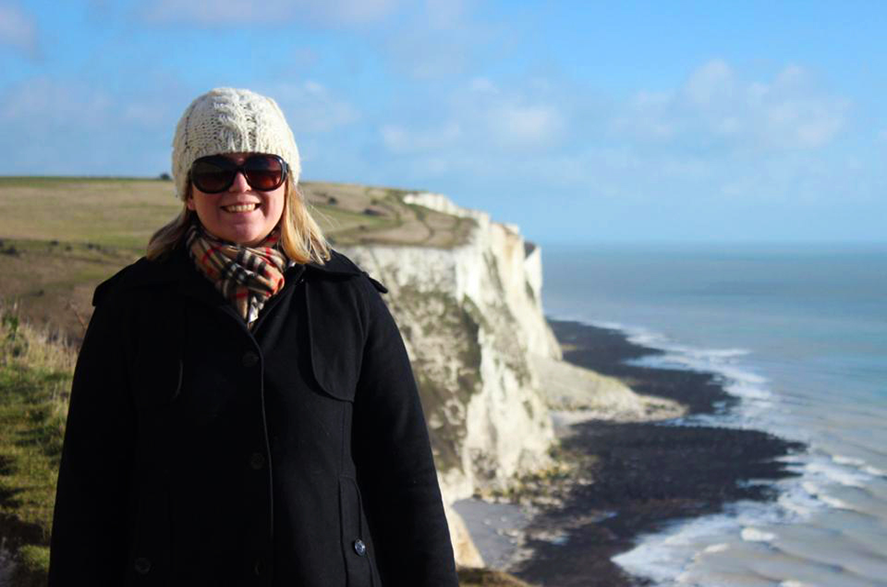How I Traveled to 40 Countries in Three Years
I continued my stiff, stilted walk to the other side. When I stepped on land, the fear evaporated. I looked up, turning my face to the azure sky and then to the unending bank of dramatic coastline views. Lush, green grass carpeted the earth. I stood in quiet contemplation of the natural beauty that surrounded me for the 60 seconds it took for Rick to catch up with me. With him by my side, we began to walk, pointing out birds, waves, rocks, other tourists who caught our attention, and for a brief moment, I forgot that I would have to return to the dreadful, swaying expanse of twigs and twine for a second time.

The late Anthony Bourdain once said, “As you move through this life and this world, you change things slightly, you leave marks behind, however small. And in return, life — and travel — leaves marks on you. Most of the time, those marks — on your body or on your heart — are beautiful. Often, though, they hurt.” My travels have impacted me in ways I never expected — spiritually, mentally, emotionally.
That Irish bridge was one of many challenges I faced during the three years Rick and I traveled to nearly 40 countries. My passport featured just a few meager stamps before we moved to Germany for three years for Rick’s job. But together we excelled as travelers. Without children and with an income that afforded us the ability to travel, we both longed to see as much of the world as possible, and we knew that meant something different for both of us. Rick created a bucket list of sports stadiums. I wanted to see all things literary, and we did our best to ensure we both got the experience we wanted. Whether on a shaky bridge or at a busy market that I longed to roam solo, he knew to give me space and didn’t mind hanging back or finding other things to do. On trips, the issues that made homelife a challenge faded, and the difficulties we experienced en route — physical demands, cancelled flights, wrong turns — drew us closer.
Of course, sometimes we expected trouble. Like the time Rick was determined to see a hockey game — his favorite sport — in Moscow. Many of our friends warned us before we left to try to blend in as much as possible. “Don’t tell them you’re American,” they said. “They hate us.” Those warnings buzzed in the back of my brain as we rushed to find the stadium and as most Muscovites rushed home from work. We entered Ploschad Revolyutsii, one of the most famous train stations in Moscow, and I marveled at red and yellow marble arches and bronze statues of Soviet people, including soldiers, farmers, and children. On the ground above us, thousands of people walked through Revolution Square, one of the busiest sections of the city, bundled in their winter coats, ushankas on their heads. Inside, we tried to decipher the subway lines. All the stops were written in Cyrillic. I was of little help to my husband, but he managed to figure the route we needed to take. Unlike me, he possessed a GPS-grade sense of direction. On every trip, he served as my compass, always guiding me to the right place. I wondered more than once if I’d be able to navigate my way without him.
I sought to know each place through their writers. Reading books based in the countries or by an author native to the country we traveled heightened the experience for me and ensured that by the time we left a country, I felt a connection to the place.
We jumped on the first train that arrived, its cars jam-packed with people, and stood close to each other, trying our best to steady ourselves as the subway lurched forward. While I was a bit concerned about how we would be perceived in a country that had such a contentious history with our own, we never let our fear stop us from traveling to the places we wanted to see. Rick was on a quest to visit as many countries as he possibly could in his lifetime. Quantity failed to thrill me. I sought to know each place through their writers. Reading books based in the countries or by an author native to the country we traveled heightened the experience for me and ensured that by the time we left a country, I felt a connection to the place. Russia loomed high on my “must visit” list. I wanted to see the country that produced some of the best authors I have ever read: Pushkin, Dostoevsky, Tolstoy. For this trip, I brought Anna Karenina with me. Several of the passages had been underlined and starred, such as: “All the variety, all the charm, all the beauty of life is made up of light and shadow.” And: “It’s much better to do good in a way that no one knows anything about it.”
But as I stood in that lurching subway car, it was not the words of Tolstoy that came to me, but the warnings about this place from our friends. I made eye contact with an older gentleman who was seated. When our eyes locked, he stood and offered his seat to me with a smile. I returned the smile, nodded, and thanked him as I sat.
Other times we expected the worst, and the trip delivered. As we walked to the entrance of Auschwitz just outside Oświęcim, Poland, we crossed the railroad tracks that led more than one million people to their deaths inside the camp. On our tour, the guide took us through various rooms that now housed the belongings stripped from prisoners upon arrival: suitcases, jackets, hats. Another room contained the prisoners’ shoes, mountains of brown and black leather. We kept walking and soon entered a room full of hair shaved from the heads of prisoners. It took a moment for me to take in the mounds — clumps of brown and blonde and black and grey strands — and I struggled to follow the words of our tour guide. My chest began to tighten as my breath quickened. The sadness of the place hung in the air, clinging to me, overwhelming me. I remember those strands to this day and how something so insignificant and light and small could serve as a testament to something so monumental and malevolent.
I didn’t know it at the time, but I returned to the states in 2016 with the lessons of all those travels in tow — the beautiful reward of tackling that shaky bridge, the gift of kindness offered by that Russian stranger, and the tangible reminder of humanity’s capacity for evil in all those locks of shorn hair. I needed them. I needed to know I possessed some internal fortitude, that people from whom I expected hate might just deliver a bit of joy, and that I must be a vigilant warrior for good in the world. In fact, the memories of those 40 trips with my trusty compass offered me some comfort when my husband and I moved back to the States, and our marriage unraveled.
That ending offered me a chance to act on something else I learned on all those trips — travel’s ability to clear a mind. I took my first solo trip two days after I served my husband with divorce papers. Something drew me to the Pacific Northwest. Perhaps the area’s reputation for dark and dreary weather mirrored my mood. I flew to Portland, Oregon, and as I rented a car at the airport, I worried I wouldn’t be able to find my way. But I knew I had to be my own compass this time. I drove two hours northwest to the port city of Astoria, and when I pulled into the parking lot of the hotel, I felt triumphant. After checking in, I wandered around the small city and then made my way to a bench overlooking the Columbia River. The ebb and flow of the river’s tide transfixed me, pulling me in to something larger, something bigger than myself. Sitting there, I realized that while my marriage may be broken, I was not. As the afternoon shifted to dusk and the temperature dropped, I began to cry for what I had lost. But I also felt grateful for all of the trips we had taken during our marriage. Remembering those trips made me hopeful for the ones that awaited me. I found peace In knowing there would be more steps to climb and (literally and figuratively) more bridges to cross.
When I boarded the plane back home to Colorado a few days later, I took my seat and peered outside my window. As the plane rose up from the ground to take flight, I noticed how sunshine blanketed the city’s skyline, placing the Willamette River, the green forests, and the distant mountains in golden relief. At that moment, I realized sunshine had been my companion the entire weekend. I sat back in my seat, pulled out a notebook and began to create a list of places I wanted to visit next.






